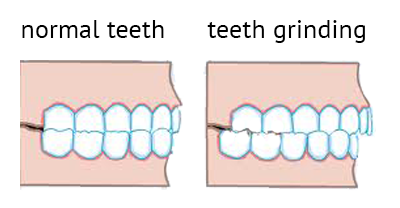Teeth Grinding (Bruxism)
Teeth grinding/clenching or Bruxism usually occurs while sleeping. The cause of bruxism is believed to be related to stress and anxiety or abnormal alignment of the teeth or jaws and can affect both children and adults. Many cases do not require treatment but if severe, it can damage your teeth and jaw muscles, which can lead to further complications.

Symptoms
- Grinding sounds during sleep
- Teeth sensitive to heat, cold, or brushing
- Tense facial or jaw muscles
- Hairline crack of the enamel on some teeth
- Sore teeth
- Inflammation of the gums (gingivitis)
- Headache especially if it is present when waking in the morning
- Damage to the inside of the cheek (from biting or chewing)
- Temporomandibular joint disorder (TMD)
- Teeth will have flattened tips, excessive wear, or thin enamel
Mental and Emotional Causes
1.Stressful Lifestyle
Teeth grinding is our body’s way of dealing with stress, pressure or any negative emotion.
2.Sleep Disorder
People who snore, talk, or experience sleep paralysis are more likely to grind their teeth.
3.Suppressed Anger
People who are experiencing a certain degree of frustration are likely to come down with teeth grinding episodes.
Physical Causes
1.Teething
Often experienced by kids, the pain associated with causes the grinding of jaws during sleep.
2.Genetics
If you or your partner brux, chances are, your children may pick up the habit.
3.Medication
Teeth grinding can sometimes occur as a side effect of taking certain types of medication like antidepressants and antipsychotics.
4.Illness
Nervous system disorder (e.g. Parkinson’s and Huntington’s) affect the body’s neural system.
5.Dehydration
Everyday habits like smoking and drinking coffee or alcohol can dehydrate you, which can trigger teeth-grinding episodes.
6.Misalignment
Poor teeth and jaw alignment frequently result in involuntary grinding of teeth.
How to Stop Grinding Your Teeth?
| Problem | Solution |
| Are you Stressed? | See a counselor, do biofeedback exercises, relax your muscles, or try meditation and yoga. |
| Do you have dental problems? | Go for Occlusal Therapy, which might just help correct your teeth alignment. |
| Are you taking medication? | Discuss this with your doctor to check for side effects and to prevent complications. |
| Do you have other health issues? | Alongside stress reduction therapies, you may want to speak with your doctor about other medications and therapies for relief. |
Types of Treatment
| Cognitive Treatment | This method focuses on changing behavior through various techniques:
|
| Orthodontic Treatment | Your dentist may recommend a protective mouth appliance, such as a night guard that can absorb the pressure of constant night grinding. |
| Medication | Medication is recommended for short-term use only:
|

